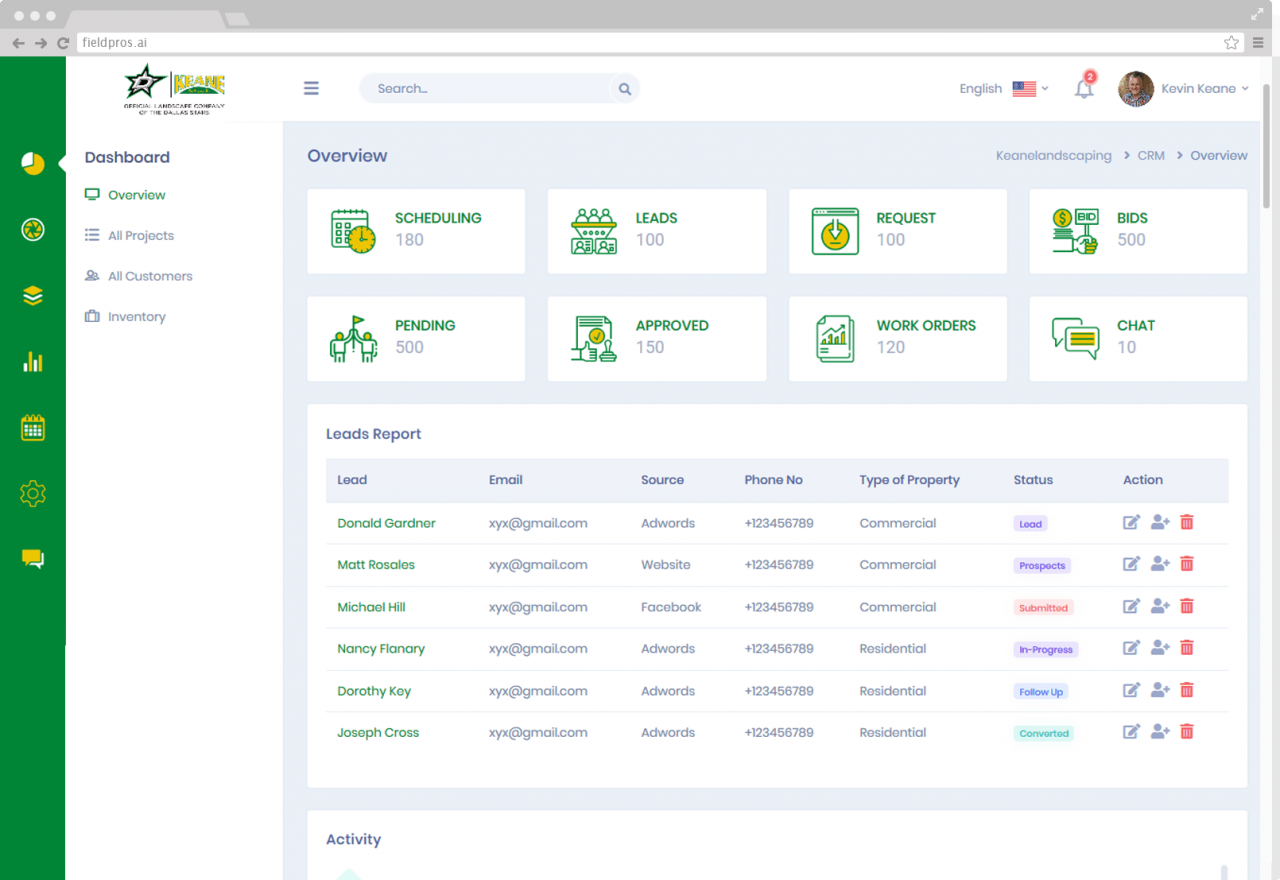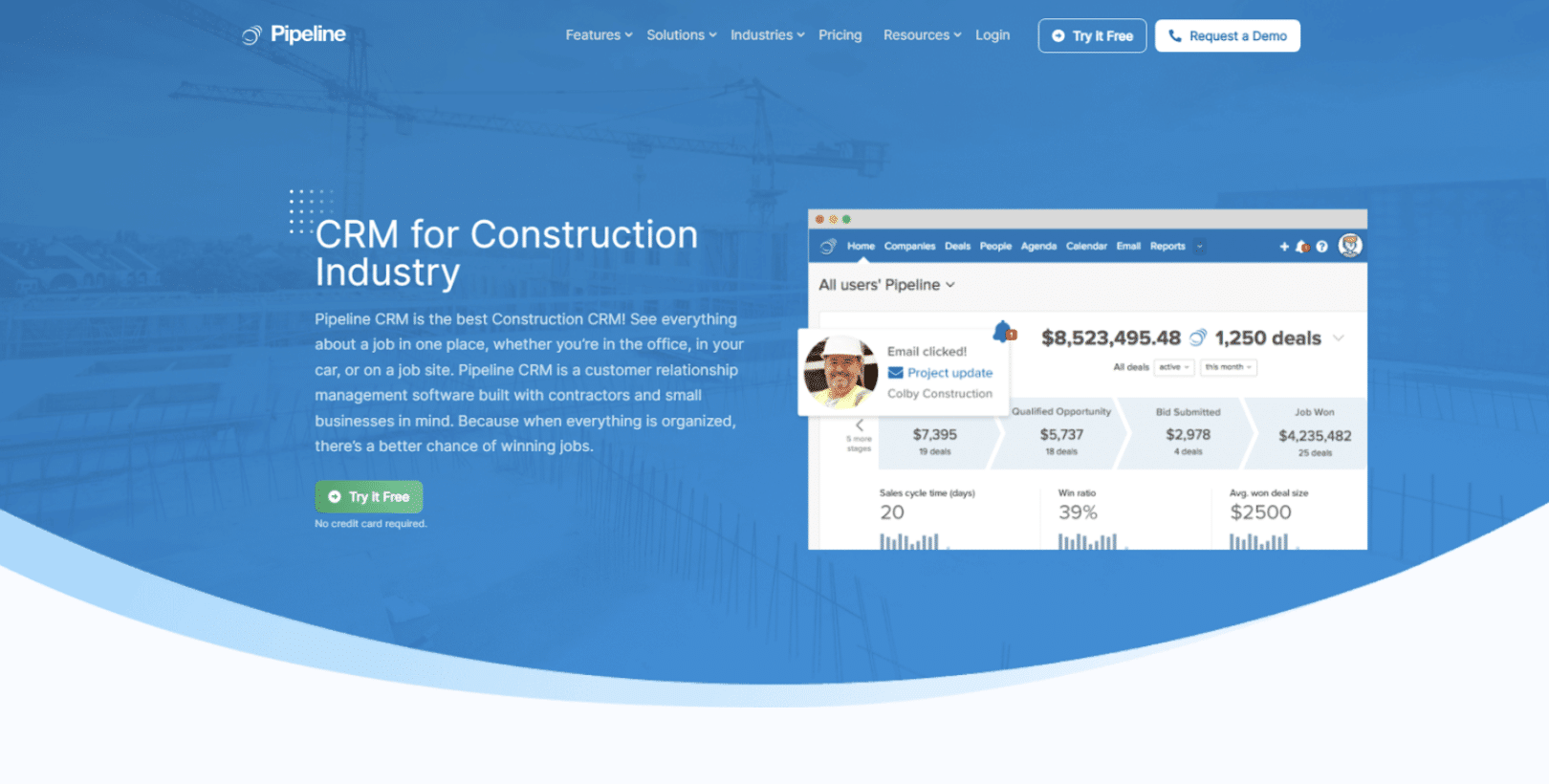In the competitive construction industry, maintaining strong customer relationships is paramount. A CRM system for construction can be the game-changer, providing a comprehensive solution to manage customer interactions, streamline processes, and boost profitability.
This advanced technology offers a wealth of benefits, empowering construction companies to nurture relationships, increase efficiency, and gain a competitive edge. Let’s delve into the transformative power of CRM systems and explore how they can revolutionize the way you manage your construction business.
Introduction
CRM in Construction
A Customer Relationship Management (CRM) system is a software solution that helps businesses manage and track their interactions with customers. It provides a centralized platform for storing customer data, managing communications, and tracking sales opportunities.In the construction industry, a CRM system can be a valuable tool for managing customer relationships and improving project outcomes.
By providing a comprehensive view of customer interactions, a CRM system can help construction companies:
- Identify and qualify new leads
- Track customer preferences and communication history
- Manage project bids and proposals
- Coordinate project schedules and deliverables
- Resolve customer issues and complaints
Benefits of a CRM System for Construction
A CRM (Customer Relationship Management) system can provide numerous benefits for construction companies. These systems help manage customer interactions, streamline processes, and improve overall efficiency and profitability.
Improved Customer Management
A CRM system centralizes customer data, including contact information, project history, and communication logs. This makes it easy for construction companies to track customer interactions and build stronger relationships. With a CRM, construction companies can:
- Easily access customer information and project history
- Track customer interactions and communications
- Provide personalized customer service
li>Identify and prioritize sales opportunities
Features of a CRM System for Construction
A CRM system for construction is a powerful tool that can help construction companies manage their customer relationships, track leads, and close deals. The right CRM system can provide construction companies with the insights they need to make better decisions, improve their efficiency, and grow their business.
There are a number of key features that a CRM system for construction should have. These features include:
- Contact management:A CRM system should allow construction companies to easily track and manage their contacts, including customers, leads, and vendors.
- Lead tracking:A CRM system should help construction companies track their leads throughout the sales process, from initial contact to close.
- Opportunity management:A CRM system should help construction companies manage their sales opportunities, including tracking the status of each opportunity and identifying potential roadblocks.
- Project management:A CRM system can help construction companies manage their projects, including tracking the status of each project, managing project budgets, and communicating with project stakeholders.
- Reporting and analytics:A CRM system should provide construction companies with the reporting and analytics they need to track their progress and make better decisions.
These are just a few of the key features that a CRM system for construction should have. By choosing a CRM system that meets their specific needs, construction companies can improve their efficiency, grow their business, and achieve their goals.
Implementation of a CRM System for Construction

Implementing a CRM system for construction requires careful planning and execution. Here are the steps involved:
- Define goals and objectives:Determine what you want to achieve with the CRM system, such as improved customer relationships, increased sales, or streamlined project management.
- Select a CRM system:Choose a CRM system that meets your specific needs and budget. Consider factors such as features, ease of use, and scalability.
- Customize the system:Tailor the CRM system to your construction business by configuring settings, creating custom fields, and integrating with other software.
- Train users:Ensure that your team is properly trained on how to use the CRM system effectively.
- Implement the system:Go live with the CRM system and monitor its performance. Make adjustments as needed to optimize its effectiveness.
Tips for Ensuring a Successful Implementation
- Get buy-in from stakeholders:Secure support from key stakeholders within your organization to ensure their cooperation and commitment.
- Start small:Implement the CRM system in phases to minimize disruption and allow for gradual adoption.
- Seek professional help:Consider working with a CRM consultant to guide you through the implementation process and provide ongoing support.
- Monitor and evaluate:Track key metrics to measure the effectiveness of the CRM system and make necessary adjustments.
Case Studies of CRM Systems for Construction
Numerous construction companies have successfully implemented CRM systems, resulting in significant improvements in their operations and customer relationships. Here are some notable case studies:
One of the leading construction companies in the United States, Skanska, implemented a CRM system to streamline its customer management processes. The system helped Skanska centralize customer data, improve communication, and enhance collaboration among its teams. As a result, Skanska experienced increased customer satisfaction, improved project efficiency, and enhanced collaboration across its global operations.
Another Example
Another example is Turner Construction Company, which implemented a CRM system to manage its extensive portfolio of projects and clients. The system enabled Turner to gain a comprehensive view of its customer interactions, track project progress, and identify potential risks.
This resulted in improved project management, increased client satisfaction, and enhanced risk mitigation capabilities.
Best Practices for Using a CRM System for Construction

To maximize the benefits of a CRM system for construction, it’s crucial to follow best practices. These practices ensure efficient use of the system and help you get the most out of its capabilities.
Centralize and Manage Data
- Consolidate all customer data, including contact information, project history, and communication logs, into the CRM system.
- Maintain accurate and up-to-date data to ensure effective tracking and analysis.
- Use the CRM system as a single source of truth for all customer-related information.
Automate Workflows, Crm system for construction
- Automate repetitive tasks such as sending follow-up emails, scheduling appointments, and generating reports.
- Streamline processes and save time by eliminating manual data entry and reducing errors.
- Focus on higher-value activities by delegating routine tasks to the CRM system.
Track and Measure Performance
- Use the CRM system to track key performance indicators (KPIs) such as sales pipeline, conversion rates, and customer satisfaction.
- Monitor progress towards goals and identify areas for improvement.
- Generate reports and dashboards to visualize data and make informed decisions.
Foster Collaboration
- Enable team collaboration by providing access to shared customer data and project information.
- Improve communication and coordination among team members.
- Break down silos and enhance cross-functional collaboration.
Continuously Evaluate and Improve
- Regularly review the effectiveness of the CRM system and gather feedback from users.
- Identify areas for improvement and make necessary adjustments.
- Stay updated on the latest CRM trends and technologies to optimize the system’s performance.
Future of CRM Systems for Construction: Crm System For Construction
The future of CRM systems for construction is bright. As the construction industry continues to grow and evolve, CRM systems will become increasingly important for businesses of all sizes.
CRM systems are expected to evolve in the coming years in several ways:
Integration with other software
CRM systems will become more integrated with other software, such as project management software, accounting software, and customer service software. This will allow businesses to have a more complete view of their customers and projects.
Increased use of artificial intelligence (AI)
AI will be used to automate tasks, such as lead generation, lead qualification, and customer service. This will free up construction professionals to focus on more strategic tasks.
Increased use of mobile devices
Construction professionals are increasingly using mobile devices to manage their work. CRM systems will become more mobile-friendly to meet this demand.
Increased use of data analytics
Data analytics will be used to improve the effectiveness of CRM systems. This will allow businesses to track key metrics, such as customer satisfaction, lead conversion rates, and project profitability.
Wrap-Up
Embracing a CRM system for construction is a strategic investment that can propel your business to new heights. With its ability to enhance customer satisfaction, optimize operations, and drive growth, a CRM system is the key to unlocking the full potential of your construction enterprise.
By leveraging its powerful capabilities, you can build lasting customer relationships, streamline your processes, and achieve unprecedented success in the competitive construction landscape.
Popular Questions
What is a CRM system?
A CRM (Customer Relationship Management) system is a software tool that helps businesses manage and track their interactions with customers and potential customers.
How can a CRM system benefit a construction company?
A CRM system can help a construction company manage customer relationships, track leads, manage projects, and improve communication.
What are some key features of a CRM system for construction?
Some key features of a CRM system for construction include contact management, lead tracking, project management, and document management.
How do I implement a CRM system for construction?
To implement a CRM system for construction, you will need to choose a CRM system, configure the system, and train your team on how to use the system.
What are some best practices for using a CRM system for construction?
Some best practices for using a CRM system for construction include using the system consistently, keeping your data up to date, and using the system to track your progress.